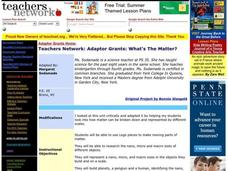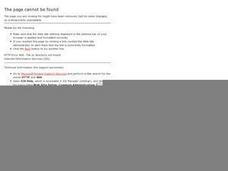Curated OER
Sensory Descriptors
Pupils feel items in a bucket and describe them using descriptive words. In this sensory descriptive lesson plan, students use words such as smoothe, rough, and bumpy.
Curated OER
Super Sort
Students sort objects based on one characteristic. They define the term "attribute" and give examples of attributes of objects. Students explain their reasoning for sorting objects into groups.
Curated OER
Heat Unit
Students define thermal equilibrium. They distinguish between internal energy and heat. Students describe how the quantity of heat that enters or leaves a substance is measured.
Curated OER
Sink or Float
First graders explore items that sink or float. They cut and glue pictures of objects that they predict will sink or float. Students place thir pictures on a picture of a bucket of water. Students then color the objects that they had...
Curated OER
Living vs. Non-Living Things
Fourth graders describe the characteristics that determine if something is living, dead, or non-living. They determine the difference between living and non-living things. Students determine if an object is living or non-living and...
Curated OER
Kites
Young scholars build a kite while integrating math and science. In this kite building lesson, students construct a blueprint and apply mathematical formulas while constructing a kite. They use appropriate flight and kite terminology to...
Curated OER
Remembrance of Yours--Analyzing Characters Using Mementos
Students choose two characters in Hamlet and symbolize the characters with an object, or find an object that the characters might carry. In this Hamlet lesson, students find an object to represent each character they choose. The object...
Curated OER
Colored Drops
Students examine the properties of a liquid that contains water and food coloring and a liquid that contains water, food coloring and a liquid detergent. They interpret their data, describe properties, and make reasonable explanations...
Curated OER
Jack and the Beanstalk: Plant a Bean and Watch It Grow
Students plant bean seeds, watch them grow, and measure them with non-standard objects. They describe the bean's growth in a journal and record the growth on a calendar.
Curated OER
What's Inside a Pumpkin?
Students made observations about the inside and outside of pumpkins. They determine that pumpkins are solids, use math vocabulary to describe the pumpkins measurements, write pumpkin booklets, and taste baked pumpkin seeds.
Curated OER
Seesaws
Students make direct comparisons between objects using balance and spring scales. They also are encouraged to estimate which object is heavier by holding the objects before using the balance scales. Comparing the masses of objects is the...
Curated OER
Let Us Be Sensible
Students describe the five senses. They perform an investigation using sensory organs associated with each of the senses. Students identify, describe and extend repeating relationship (pattern) found in common, objects, sounds and...
Curated OER
What is Sound? How Can We Change Sound?
In this instructional activity, students investigate the phenomenon of sound! Students compare and contrast how sound travels through solids, liquids, and gases. They explain how length and thickness affect sound. Students know the...
Curated OER
What's The Matter
Learners identify and describe the different stages of matter. In groups, the use lego pieces to represent the moving parts of matter. They use the internet to research the meanings of nano, micro and macro sizes. They also use the...
Curated OER
Playground Zoom
Learners observe and draw small objects on the playground or in the classroom with and without a magnifying glass. They explore how lenses can affect the way that an object is observed from afar or remotely sensed. Afterwards, they share...
Curated OER
Density Lab
In this biology worksheet, students use the website given to become familiar with the equipment of a lab. The activity involves a link to a virtual laboratory. Then they determine an objects mass and volume by placing it in a graduate...
Curated OER
Solids, Liquids, and Gases
Learners explore solids, liquids, and gasses and categorize and describe the three states of matter. For this chemistry lesson, students categorize items as solid, liquid, or gas based on the definitions given by the teacher. Learners...
Curated OER
Parallel Lines
In this parallel lines worksheet, 10th graders solve 10 different problems that include determining various parallel lines. First, they describe the locus of an object that has to be kept equidistant from 2 parallel objects. Then,...
Curated OER
Beauty
Students bring an object to school that is of significant sentimental value to them. They arrange the objects in a class display, examine each other's artifacts and discuss the implications and cultural bias of the word 'beauty'.
Curated OER
Clothing
Learners count and describe clothing on a clothesline in Spanish. Answering yes or no questions, they put on a specific item. They identify the item's location on the clothesline as well. They use paper and markers to design their own...
Curated OER
The Multiplier (2-digit by 2-digit numbers)
Fourth graders Split a 2-digit number into tens and ones. They use The Multiplier to partition and solve 2-digit by 2-digit multiplications. They describe how to solve 2-digit by 2-digit multiplications using a diagram.
Curated OER
The Gingerbread Man
In this unit students use the traditional tale of the gingerbread man as a context for ordering and comparing lengths. They compare the length of two objects directly, order three or more objects by length and select objects that are...
Curated OER
Properties of Matter: "Sink or Swim"
Third graders recognize that different materials have different properties which can be observed such as texture and bouyancy, and compare and contrast, through observation, ability of some objects to float because of action of...
Curated OER
Grade 2: Roll or Slide?
Second graders organize solids into categories, depending upon whether they will roll, slide or do both on a home made ramp. Students describe and compare attributes of three-dimensional geometric solids.























